Ford added the name “Torino” to its Fairlane intermediate starting in model year 1968. You could still get a Fairlane wagon in ’69, but this 1969 Ford Torino Squire occupied the top trim level with its wood-grain sides and full wheel covers. Fancy! With the mighty Cobra Jet 428 unavailable, wagon buyers requesting the “big motor” got this car’s healthy four-barrel 390 V8. Thanks to lov2xlr8 for some details. We’ve featured what looks like the same car twice before, thanks to the digital prose of Jim ODonnell (April 2024) and Russ Dixon (November 2023). Hopefully the third date will get this ride hooked up with a new owner.
The new-for’68 dash features round dials. A stout C6 three-speed automatic transmission handles the gear-changes on this six-seater. The circle on the brake pedal indicates optional power disc brakes, and the seller says rear discs have replaced the original drums. That’s an interesting choice for the car’s only significant deviation from stock. Cloth upholstery has replaced original blue vinyl.
While full-sized wagon buyers could option up a two-barrel 390, Fairlane and Torino buyers stepping up from the 351 got the S-code 10.25:1 compression ratio, four-barrel version making 320 HP, according to original brochures. A Marti report in the listing counts this among 319 Torino Squires built with the 390 / C6 combination.
The Magic Doorgate swings open on side hinges for easy loading and also drops down tailgate-style to accommodate oversized cargo or the posteriors of multiple sports fans. It’s magic! This car’s full tinted glass normally accompanied air conditioning, but this Squire’s air comes conditioned only by ambient weather.
Originally sold in Colorado, this northern California classic shows heavily-weathered plastics. That and the sun-burned paint suggests outdoor storage. The next owner may find arranging for a paint job vastly easier than chasing down 55 year-old interior parts for a two-year only body style wagon. Ford offered a trio of wagon platforms in 1969, making this middle option the Goldilocks choice for many buyers. Check our more pictures and some misleading random words that have nothing to do with the car here on Craigslist. The asking price of $7500 splits the difference between the last two times we covered this ride. Does the big 390 make this never-restored Torino Squire your must-have people-mover?
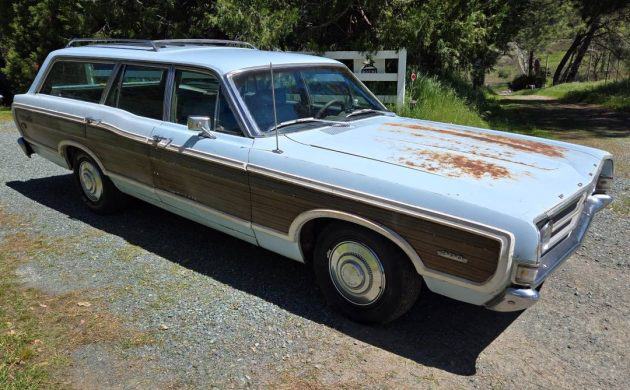
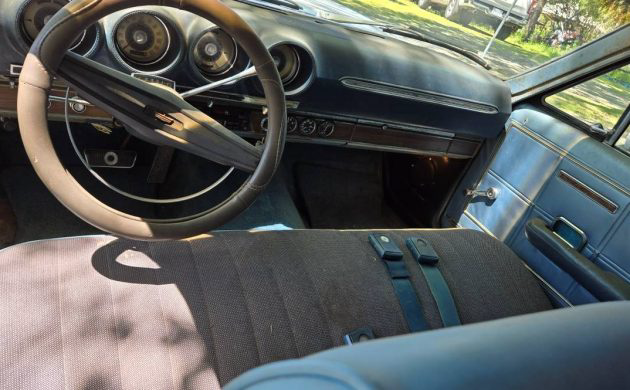
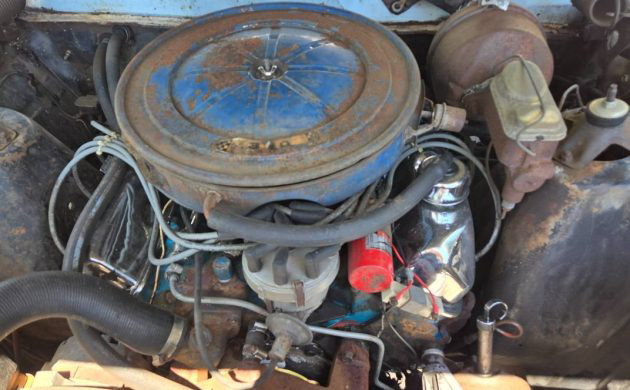
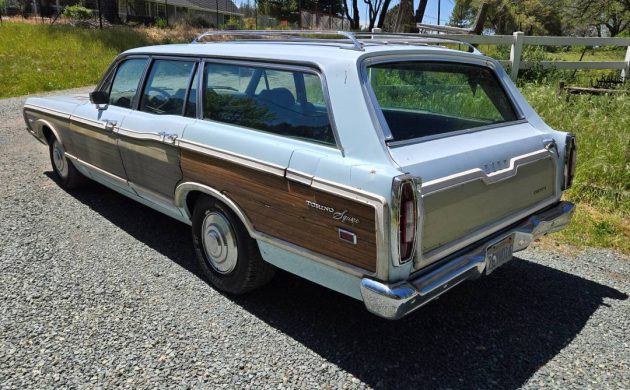
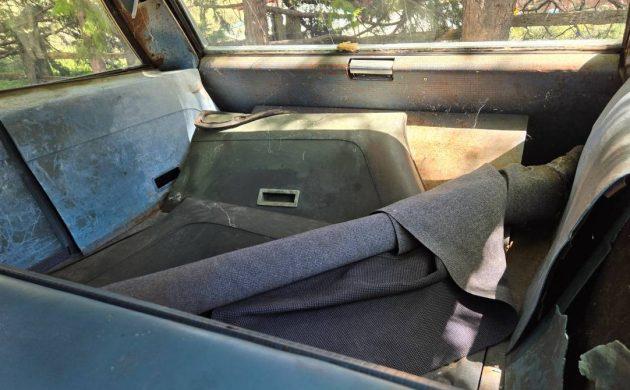




Hi-compression is an Olds term they used on their 330’s. 330 H.C. was also good for 320 ponies.
My old mans Olds 98s had “Ultra-High Compression” 394s, that required premium gas, yet the old man ran it on the cheap stuff anyways. It pinged like a Geiger counter in Nevada, but no apparent damage.
Good catch. I’ve even seen the words “ultra high compression” under the hood of some old Olds
My 69 Cutlass has the “H.C.” 350. 10.25 cr. 310hp 390tq. Runs ok with 90 ethanol free, as long as I keep the idle just right. Wish I had access to ethanol free higher octane
Best part of filling up is the premium fuel only marked gas cap
Ad says “no rust”, well what’s that on top of the hood?
Sunburn. Anything that can be removed with a DA isn’t in the same league as rust through. Nobody I know would think twice about surface rust like that on the hood of this car. If it had rust holes on the leading edge of the hood or anywhere else that needs to be cut out and have a patch welded in is a different story.
Compared to cars from rust prone states, where there are obvious rust bubbles that haven’t broken through the paint or filler over active rust this is “rust free”. Which would the average person prefer to deal with?
Steve R
It should be noted, 10.5 to 1 wasn’t necessarily considered high compression then. Fact is, just about every Ford big block 4 barrel had at least that from the factory. Some even came 11 to 1. Many trucks had higher compression motors, it was a way to get some more HP. The downside, they required higher priced fuel( chuckling, what, .04 cents more?) and consequently, got poorer gas mileage. The 390 was without question, Fords most popular big block. It was available across the board in a host of applications. I remember piles of them.
This car? A bit rich for a beater wagon, despite growing popularity, however, like most, try and find one today. Wagons, of all kinds, led rough lives. Driven until the doors fell off, going through several siblings before the last one took the motor for that 6 cylinder Mustang they got for $50. The crusher got the rest.
Love the packing crate sides but that spongy steering wheel wrap gives me the heebie-jeebies.
This car has been 4-sale for at least over a year. The location is in the Sierra Foothills area near Placerville, Ca. The rain is moderate with an occassional dusting of snow. It is possible this vehicle has more rust than the photos show, but who really knows.Still, a rare wagon with only 319 built.
In my world the motor is too big (heavy), the woody vinyl has got to go, and the price is too high for what it is.
But I love those later 60’s, early 70’s midsize ford wagons. Though with a small block for motivation is much better for overall balance.
This would make a great daily driver, workhorse. Right up my alley.
Point of reference, which I’m guessing most here know, if it don’t sell you’re asking too much.
Back in the day a car like this in this condition would have its engine pulled out for a Mustang or a Torino 2 door, and the rest scrapped
Along with the 9” rear and disc brakes.
Steve R
I love a wagon, in fact have a 66 AMC American sitting patiently under my juniper trees waiting for it to cool off so me n the dogs can take it out for a ride. Just watched Freiburger do a run down the west coast, east side of the Sierras in a 71 Torino wagon it was a good watch. Too much money for this multiple show up wagon, though for my needs.
A potential restoration/restomod candidate, if the underbody is solid. The one downside for the Ford midsize wagons is that until 1972, the midsize wagons were unibody construction, while the full-size Fords were body-on-frame construction, until the Torino got a full frame starting in the 1972 model year (September, 1971).
I think no AC is one reason so many pass on this one. these days, even i wouldn’t by a car without it. It’s out on my 04 Grand Marquis and i miss it so much but the car, although it runs perfectly, isn’t worth the grand or more it would take to fix it.
Gone!
Back in the Ford garage in the 70’s, I had a college professor customer w/ a 68 Montego wagon with a 390 four barrel, c6. He was a great guy, always looking to make it go faster. I rebuilt the engine for him and slipped in a bigger cam and aluminum intake and 3:91 gears in the 9 in. rear. Boy, you could pull the wheels with that thing. I can still see him manually shifting that column shifter with his foot to the floor! Fun times.